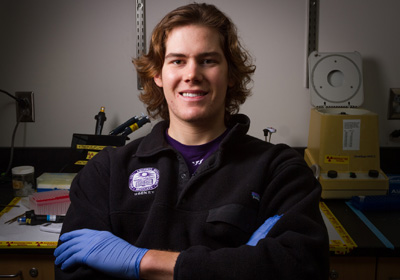AMHERST, Mass. -- Christopher Finch ’14, Amherst College’s latest recipient of a Churchill Foundation Scholarship, intends to apply science to benefit a hungry planet, much in the way he conducted research to help fellow hockey players avoid injury.
The scholarship will allow the Steamboat Springs, Colo., native to conduct research in plant bioengineering next year at the University of Cambridge in England. For Finch, this award comes toward the end of an Amherst career noted for excellence in science and its application to real-world issues.
In the fall of 2012, Finch, who plays forward for the Amherst men’s ice hockey team, developed and led concussion awareness workshops for youth sports coaches in the Amherst community, based upon research he conducted with Dr. James Hudziak the previous summer at the University of Vermont College of Medicine. His study, “Neuroanatomical Sequelae of Sports-Related Head Injury,” grew out of watching teammates having to endure months of recovery for traumatic brain injury. The hockey team now incorporates concussion-preventative neck strengthening into their training.
Elected into Phi Beta Kappa after his junior year, Finch is majoring in biochemistry and biophysics. He is a 2013 recipient of the Barry M. Goldwater Scholarship and was an Amgen Scholar at the California Institute of Technology. This past summer at Caltech, Finch worked on a project involving optogenetics, a branch of neuroscience that uses a combination of techniques from optics and genetics to control and monitor living nerve cells. He was also the 2012 recipient of Amherst College’s Sawyer Prize, awarded to the sophomore who has shown the most promise in studying biology. He ended his first year at Amherst College winning the CRC Press Chemistry Achievement Award.

At Cambridge, Finch plans to work with Professor Alison Smith in her lab in the Department of Plant Sciences, exploring plant biotechnology in a project focusing on the genetic structure of green algae. His goal is to understand the science of plant engineering as a way to increase food supplies.
“The Earth’s population already stresses food resources, even as that population continues to burgeon,” Finch wrote in his application for the Churchill Scholarship. “Plant bioengineering provides unique tools to feed a growing world … [T]ransferring and modifying genes between and within organisms can produce plants with enhanced drought resistance, growth properties, and nutritional density.”
Finch intends to combine studies in plant bioengineering research with entrepreneurship. “I aspire to bring my scientific innovations in plant bioengineering to market in order to help bolster global food security,” he wrote.
Sandra L. Burkett, associate professor of chemistry at Amherst, noted that the project “brings together [Finch’s] passion for molecular biology and bioengineering with his entrepreneurial spirit and social conscience, and reflects his penchant for taking on challenging and ambitious projects.”
Finch “does not shy away from the potential controversies of bioengineered crops, and instead addresses the challenge head-on by critically assessing and working to find a scientific solution to the known and perceived hazards,” she said.
Finch said his long-term goal is to pursue a Ph.D. in bioengineering.
The Winston Churchill Foundation of the United States was established in 1959 as an expression of American admiration for one of the great leaders of the free world. With the enthusiastic endorsement of Sir Winston, the Foundation undertook to encourage the exchange of knowledge and the sharing of ideas in science and technology between the United States and Great Britain. The Churchill Scholarship Program enables outstanding American students to do graduate work in engineering, mathematics and the physical and natural sciences at the University of Cambridge while residing at Churchill College. The scholarship, worth about $53,000 to $63,000, depending on the currency exchange rate, covers college fees and provides a living allowance, including travel expenses. At least 14 Churchill Scholarships are offered annually.
In addition to Finch, eight other Amherst College graduates have won the scholarship since 1980, in the fields of mathematics, chemistry, genetics and physics.